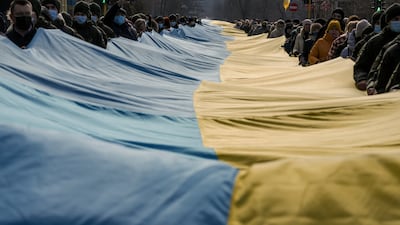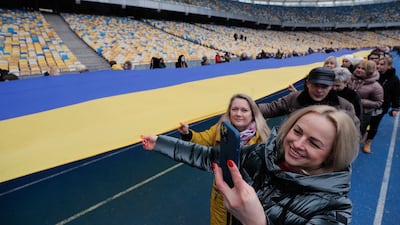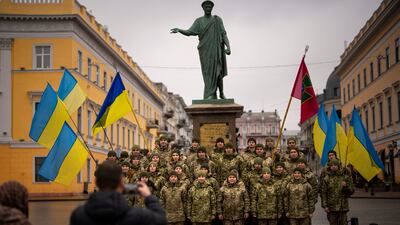If any good is to emerge from the deepening crisis in Eastern Europe, it is the growing evidence that the western alliance may finally have rediscovered the unity of purpose necessary to deal with Russia's troop build-up on the Ukrainian border.
Ever since the US-led Nato security alliance presided over the catastrophic withdrawal of its forces from Afghanistan last summer, serious concerns have been raised about the ability of the West to present a united front when dealing with a major crisis. One of the defining features of the Afghanistan fiasco was Washington's willingness to act unilaterally and without engaging in proper consultation with fellow Nato member states and other allies, a failing that contributed significantly to the subsequent chaos that unfolded at Kabul airport as the US and its partners struggled to implement their individual responses to the crisis.
No one would have followed these humiliating events, at least from the West’s point of view, more closely than Russian President Vladimir Putin who, in his desire to reassert Moscow's standing on the world stage, looks to seize upon any sign of weakness or division among its rivals. Indeed, it has been argued that a key motivating factor in Moscow's decision to mount a military presence on the Ukrainian border has been his desire to test the West's resilience, specifically Washington's leadership role.
Even US President Joe Biden's most loyal acolytes would concede that their leader's first year in office has been less than impressive, especially when it comes to working with key allies. Mr Biden's neglect of America's vital relationship with Europe was reflected in the fact that his administration spent nearly all of last year without having appointed ambassadors in many of the continent's capitals, including Berlin, Paris and London, a failing that undermined its attempts to maintain cordial ties.
Indeed, Mr Biden's less-than-convincing performance, on global issues as well as domestic concerns, has led some prominent members of his Democratic Party to question whether he should run for re-election in 2024.
That Mr Biden, in cohort with his European allies, has helped to forge something approaching a coherent and unified approach to the Kremlin's moves near Russia's border with Ukraine is a welcome sign. He has proved that, in a time of crisis, the West still has the ability to summon the resolve to tackle major global issues.
Mr Biden's response has not been faultless. He apparently misspoke during a news conference to mark his first year in office, when he seemed to question whether Nato would respond if Russia only carried out a "minor incursion" in Ukraine. Mr Biden was obliged to issue a hasty clarification the next day, making it "absolutely clear" that any Russian move into Ukraine would be seen as an "invasion".

Nor has Mr Biden been the only prominent western leader to struggle to mount an effective response. French President Emmanuel Macron appeared to suggest he was willing to compromise Kiev's sovereignty in return for getting Mr Putin to scale down Russia's military presence on the border.
New German Chancellor Olaf Scholz was another key western leader whose performance has been questioned after he described Ukraine's hopes of one day acquiring membership of the Nato alliance as "absurd". Germany's willingness to cut a deal with Moscow, which it relies upon heavily for its energy needs, on the Ukraine issue caused so much alarm in Washington that Mr Biden felt obliged to hurriedly arrange a summit with Mr Scholz to get him to toe the line.
Despite these wobbles, however, Nato has remained robust in rejecting all of the Kremlin's key demands.
As tensions over Ukraine deepened towards the end of last year, Mr Putin made clear his requirements for de-escalating the crisis by presenting Nato with a highly contentious list of security guarantees contained in an eight-point draft treaty released by the Russian foreign ministry in December. The demands included a ban on Ukraine entering Nato and a limit to the deployment of troops and weapons to Nato's eastern flank, in effect returning alliance forces to where they were stationed in 1997, before an eastward expansion.
After studying the proposals in detail, both the US and Nato have formally rejected Russia's demand limiting Ukraine's membership of Nato, while offering the possibility of opening discussions on areas such as missile defence and transparency over military drills. The alliance, moreover, has maintained a unified position in this regard, even if some member states, such as France and Germany, would prefer to find a compromise solution to ease tensions.
This welcome – and some would say long-overdue – display of Nato unity has certainly made life a lot more difficult for the Kremlin, as it contemplates its next move.
Despite the Russian defence ministry's claims earlier in the week that Moscow had begun withdrawing some of its heavy armour, western security officials remain unconvinced. They are concerned that Russia remains committed to establishing a friendly regime in Kiev through military force. While a possible invasion date of February 16 mooted by US intelligence passed without incident, both western and Ukrainian leaders have not ruled out the possibility of an invasion in the coming weeks.
And if an invasion does take place, having a robust and unified western alliance will be vital to dealing with the most formidable security challenge Europe has faced since the Second World War.










